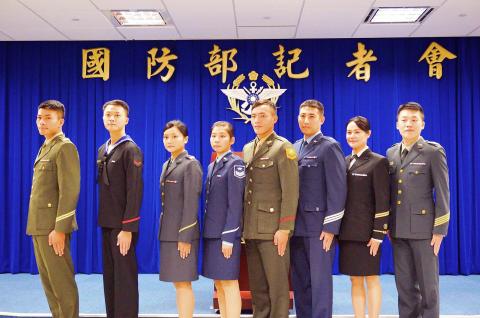The Ministry of National Defense (MND) yesterday reiterated its goal to build an all-volunteer military force by 2018 after Minister of National Defense Feng Shih-kuan (馮世寬) told lawmakers on Monday that conscription would end in 2018.
It is the ministry’s goal to cease drafting citizens into service by 2018, “a goal that has to be worked toward,” said Major General Fu Cheng-jung (傅政榮), director of the Human Resources Division of the ministry’s Resources Management Department.
However, Fu’s comment was more ambiguous than Feng’s, who also said that ending conscription by 2018 was “a decision that should not be changed.”

Photo: Tu Chu-min, Taipei Times
The ministry had previously been more flexible about the deadline for an all-volunteer force.
Fu said that the number of volunteer soldiers and officers has increased steadily in accordance with the ministry’s predictions.
However, he did not give a direct reply when asked whether the military would have to continue conscription should it fail to recruit the necessary number of volunteers.
“The nation’s military service system has not changed, and the draft system and the volunteer system have been developed in parallel,” he said.
The ministry in 2008 announced that it would build an all-volunteer force by 2014, but ended up having to push back its target date for ending conscription several times.
Men born after 1994 are now exempt from one-year compulsory military service, but will still be required to undergo four months of mandatory military training upon reaching conscription age.
In other defense-related news, amid concerns over Chinese military aircraft that have circled Taiwan’s air defense identification zone twice in two weeks, the ministry said the military will confront intruding Chinese military aircraft “fearlessly, without evasion or weakness.”
However, the military’s exact response would vary depending on whether the intruding aircraft appear hostile, Joint Operations Division Director Major General Chung Shu-ming (鍾樹明) said.
The military monitors China’s military maneuvers closely and was fully aware of the two training missions around Taiwan’s airspace, he said.
It opted to deal with the situation in a way that would not provoke conflict, Chung said.
In the event of a Chinese military fleet with reconnaissance capabilities circling Taiwan, the military would impose a strict control over high-tech weapons and other signal-emitting sources to prevent China from accessing sensitive data, Chung said.
As an example of that flexibility, ministry spokesman Major General Chen Chung-chi (陳中吉) said that a live-fire exercise of the Sky Bow II surface-to-air missile system in October at a base in Pingtung County was canceled after a Chinese reconnaissance ship was discovered off the southern coast.
In addition, the military has a humanitarian contingency plan to rescue the crew of Chinese military vessels should an accident occur, the ministry said.
Search and rescue missions would be deployed if Chinese vessels were involved in an accident in areas to the east of the middle line of the Taiwan Strait, Chung said.
China would be in charge of the search and rescue effort if such an accident occurred to the west of the middle line, he said.

Chinese Nationalist Party (KMT) Chairman Eric Chu (朱立倫), spokeswoman Yang Chih-yu (楊智伃) and Legislator Hsieh Lung-chieh (謝龍介) would be summoned by police for questioning for leading an illegal assembly on Thursday evening last week, Minister of the Interior Liu Shyh-fang (劉世芳) said today. The three KMT officials led an assembly outside the Taipei City Prosecutors’ Office, a restricted area where public assembly is not allowed, protesting the questioning of several KMT staff and searches of KMT headquarters and offices in a recall petition forgery case. Chu, Yang and Hsieh are all suspected of contravening the Assembly and Parade Act (集會遊行法) by holding

PRAISE: Japanese visitor Takashi Kubota said the Taiwanese temple architecture images showcased in the AI Art Gallery were the most impressive displays he saw Taiwan does not have an official pavilion at the World Expo in Osaka, Japan, because of its diplomatic predicament, but the government-backed Tech World pavilion is drawing interest with its unique recreations of works by Taiwanese artists. The pavilion features an artificial intelligence (AI)-based art gallery showcasing works of famous Taiwanese artists from the Japanese colonial period using innovative technologies. Among its main simulated displays are Eastern gouache paintings by Chen Chin (陳進), Lin Yu-shan (林玉山) and Kuo Hsueh-hu (郭雪湖), who were the three young Taiwanese painters selected for the East Asian Painting exhibition in 1927. Gouache is a water-based

Taiwan would welcome the return of Honduras as a diplomatic ally if its next president decides to make such a move, Minister of Foreign Affairs Lin Chia-lung (林佳龍) said yesterday. “Of course, we would welcome Honduras if they want to restore diplomatic ties with Taiwan after their elections,” Lin said at a meeting of the legislature’s Foreign Affairs and National Defense Committee, when asked to comment on statements made by two of the three Honduran presidential candidates during the presidential campaign in the Central American country. Taiwan is paying close attention to the region as a whole in the wake of a

OFF-TARGET: More than 30,000 participants were expected to take part in the Games next month, but only 6,550 foreign and 19,400 Taiwanese athletes have registered Taipei city councilors yesterday blasted the organizers of next month’s World Masters Games over sudden timetable and venue changes, which they said have caused thousands of participants to back out of the international sporting event, among other organizational issues. They also cited visa delays and political interference by China as reasons many foreign athletes are requesting refunds for the event, to be held from May 17 to 30. Jointly organized by the Taipei and New Taipei City governments, the games have been rocked by numerous controversies since preparations began in 2020. Taipei City Councilor Lin Yen-feng (林延鳳) said yesterday that new measures by